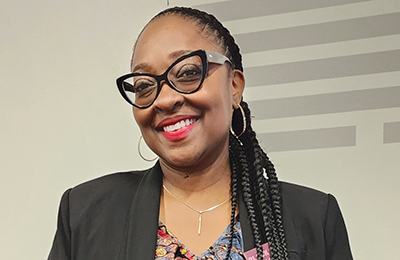
By Hunter Gilmore
(Source Atlanta Daily World):
Health disparities continue to plague marginalized communities across the United States. Narrow into the southern region of the country, and jarring statistics persist to paint a jarring picture of what is happening in our communities, and it’s not being amplified enough.
Black women are disproportionately affected by issues such as HIV/AIDS. According to The Satcher Health Leadership Institute at Morehouse School of Medicine, in Georgia, the rate of Black females living with an HIV diagnosis is 11.7 times that of their white counterparts.
It’s alarming statistics like these that serve as the basis for the life work of Dr. Maisha Standifer, Director of Population Health for the Satcher Health Leadership Institute at Morehouse School of Medicine.
For over two decades, Dr. Standifer has dedicated her career to implementing targeted strategies aimed at reducing social determinants within vulnerable populations around the country and beyond its borders. According to her, it all comes down to healthcare equity.
At Georgia Thrives, she remains on the front lines in advocating for this cause and spreading the much-needed education surrounding health outcomes in marginalized communities. A portion of her trailblazing work addresses structural barriers within southern Black communities regarding HIV tests, treatment, and ongoing care.
In an exclusive interview with ADW, Dr. Standifer provided insights into the root causes of these health disparities and the strategies being employed to combat them. She emphasized the historical and systemic factors, including racism and housing inequities, that contribute to the disproportionate burden of diseases like HIV/AIDS on Black communities.
“We need to really focus on the root efforts of historical factors and historical racism being embedded in all structural elements here in the United States so we can really dive down into health outcomes within disenfranchised communities,” Dr. Standifer said. “We could talk about African American communities here. We could talk about gender minority communities as well. We could talk about sexual health. Again. We’re talking about the spaces in places where sexuality and sexual health is not allowed to be discussed, let alone to be even addressed and highlighted as being something that’s embedded within the public health system.”
Dr. Standifer shed light on the alarming prevalence of HIV/AIDS in Georgia’s Black communities, with statistics revealing that 1 in 51 people in Atlanta may be infected with HIV/AIDS at any given time. Metro Atlanta ranks in the top five cities nationally for people living with HIV, with counties like Fulton, DeKalb, and Clayton reporting high numbers of individuals living with an HIV/AIDS diagnosis per 100,000 residents.
Furthermore, Dr. Standifer underscored the critical role of stigma in hindering HIV/AIDS prevention, testing, and treatment efforts within Black communities. She reiterated the importance of destigmatizing conversations around sexual health and creating safe spaces for open dialogue.
“We’re tapping into some of those novel spaces that public Health hasn’t traditionally tapped into and making sure we’re pushing forward some of the messaging. A few decades ago, we noticed some places where populations often frequent and feel comfortable with some of the dialog,” Dr. Standifer continues, “We noticed that places where people go and spend money to look nice are beauty salons and barbershops. It’s a frequent place, especially within our population, and it was really telling as I worked with people in the cancer space. They were able to connect with salons and stylists to educate them.”
She added: “They have people in their shops for 3 or 4 hours braiding, gluing, or straightening hair for those hours. They’re able to talk and have dialog and open conversations, whether it be about cancer, diabetes, colon cancer, breast cancer, or HIV. We’re arming stylists, who we call our community health ambassadors.”
Another innovative approach Dr. Standifer highlighted is the use of social media influencers to help disseminate accurate information and promote HIV/AIDS awareness and prevention online.
Looking ahead, Dr. Standifer outlined Georgia Thrives’ plans in continuing to amplify voices within marginalized communities, expand initiatives, and advocate for health equity in policy making.
“We have aligned ourselves with Georgia policymakers and congresspersons to have them be educated about the state of sexual health, and the state of HIV. You’d be surprised that some of these policy policymakers are still making policies from data from 40 years ago. And that is unfortunate. So, we are connecting with some caucuses, tri caucus and other spaces that say, okay, let’s sit down, let’s have a roundtable,” Dr. Standifer said.
Moreover, the organization also aims to leverage partnerships with healthcare providers and community stakeholders to advance efforts in eliminating health disparities and promoting holistic approaches to healthcare delivery.
Dr. Maisha Standifer’s pioneering work exemplifies a commitment to addressing health disparities and promoting health equity among Black women and vulnerable communities. Through her leadership and collaborative efforts, Georgia Thrives and The Satcher Health Leadership Institute continue to champion initiatives that empower individuals, dismantle systemic barriers, and foster healthier communities for all.


Be the first to comment